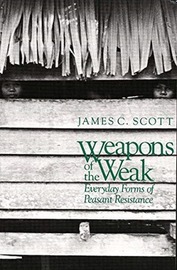jstor.org
Always private
DuckDuckGo never tracks your searches.
Learn MoreYou can hide this reminder in Search Settings
All regions
Argentina
Australia
Austria
Belgium (fr)
Belgium (nl)
Brazil
Bulgaria
Canada (en)
Canada (fr)
Catalonia
Chile
China
Colombia
Croatia
Czech Republic
Denmark
Estonia
Finland
France
Germany
Greece
Hong Kong
Hungary
Iceland
India (en)
Indonesia (en)
Ireland
Israel (en)
Italy
Japan
Korea
Latvia
Lithuania
Malaysia (en)
Mexico
Netherlands
New Zealand
Norway
Pakistan (en)
Peru
Philippines (en)
Poland
Portugal
Romania
Russia
Saudi Arabia
Singapore
Slovakia
Slovenia
South Africa
Spain (ca)
Spain (es)
Sweden
Switzerland (de)
Switzerland (fr)
Taiwan
Thailand (en)
Turkey
Ukraine
United Kingdom
US (English)
US (Spanish)
Vietnam (en)
Safe search: moderate
Strict
Moderate
Off
Any time
- Was this helpful?
- This sensitive picture of the constant and circumspect struggle waged by peasants materially and ideologically against their oppressors shows that techniques of...
archive.org
This sensitive picture of the constant and circumspect struggle waged by peasants materially and ideologically against their oppressors shows that techniques of evasion and resistance may represent the most significant and effective means of class struggle in the long run.en.wikipedia.org
Weapons of the Weak: Everyday Forms of Peasant Resistance is a 1985 book on everyday forms of rural class conflict as illustrated in a Malaysian village, written by anthropologist James C. Scott and published by Yale University Press.. In Weapons of the Weak, Scott turns his attention to the daily, subtle forms of resistance employed by villagers, a shift from the traditionally studied grand ...libcom.org
To ignore the self-interested element in peasant resistance is to ignore the determinate context, not only of peasant politics, but of most lower class politics. It is precisely the fusion of self-interest and resistance that is the vital force animating the resistance of peasants and proletarians.dl1.cuni.cz
is capable of battening itself on its peasant subjects even more effectively than its predecessors. For these reasons it seemed to me more important to understand what we might call everyday forms of peasant resistance--the prosaic but constant struggle between the peasantry and those who seek to extract labor, fuod, taxes, rents,en.wikipedia.org
In Weapons of the Weak: Everyday Forms of Peasant Resistance (1985) Scott expanded his theories to peasants in other parts of the world. Scott's theories are often contrasted with Gramscian ideas about hegemony. Against Gramsci, Scott argues that the everyday resistance of subalterns shows that they have not consented to dominance. [16]tandfonline.com
Taylor & Francis Online
https://www.tandfonline.com › doi › abs › 10.1080 › 03066158608438289
Everyday forms of peasant resistance Jim Scott Department of Political Science, Yale University, P.O. Box 3532 Yale Station, New Haven, CT, 06520-3532, USA Pages 5-35 | Published online: 05 Feb 2008yalebooks.yale.edu
Yale University Press
https://yalebooks.yale.edu › book › 9780300036411 › weapons-of-the-weak
"Splendid. . . . Combines the readability of Akenfield or Pig Earth with an accessible and illuminating theoretical commentary."—A. F. Robertson, Time...dannyreviews.com
dannyreviews.com
https://dannyreviews.com › h › Weapons_of_the_Weak.html
In Weapons of the Weak he takes up a similar subject, this time looking at ordinary, everyday peasant resistance and the reasons open revolts are so rare. One of his main goals is to resolve empirically debates within political science over the concepts of false consciousness and hegemony. Scott himself is a political scientist by training, but ...archive.org
Everyday forms of Resistance / James C. Scott -- Between Submission and Violence: Peasant Resistance in the Polish Manorial Economy of the Eighteenth Century / Jacek Kochanowicz -- Saboteurs in the Forest: Colonialism and Peasant resistance in the Indian Himalaya / Ramachandra Guha -- The Conspiracy of Silence and the Atomistic Political ...Can’t find what you’re looking for?
Help us improve DuckDuckGo searches with your feedback
